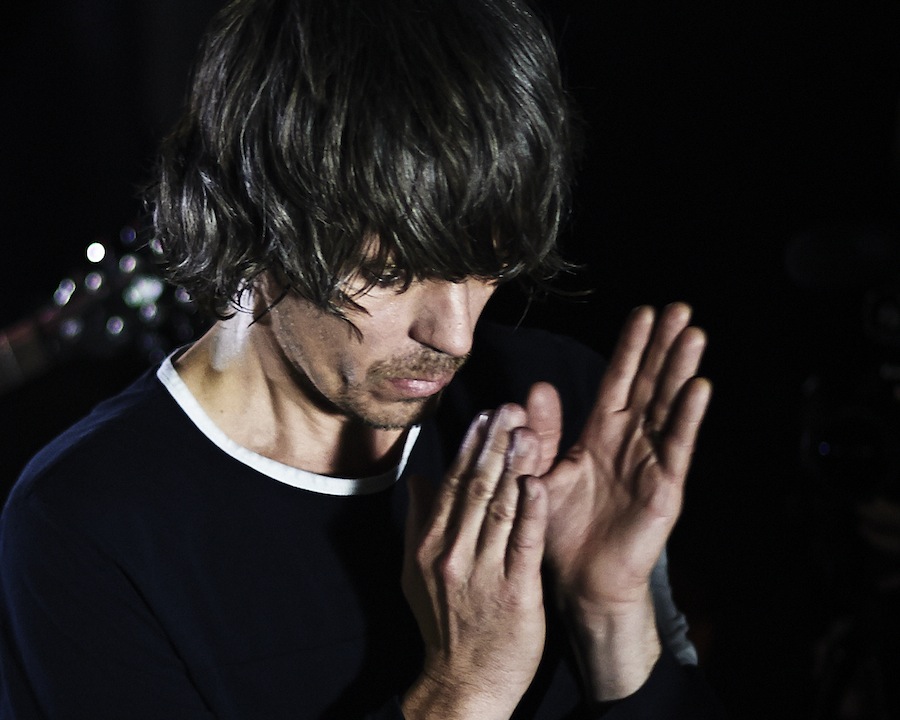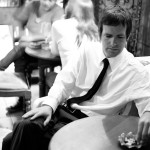
Words by Andrew Parks
While we’ve always loved everything about Wayne Coyne–his loose-lipped social media presence, his bittersweet lyrics, and his undeniable skills as a showman in an era that’s sorely lacking them–one thing that always gets lost in Flaming Lips features is just how crucial Steven Drozd is to the band’s well-being. Long considered the secret weapon of their songwriting, the multi-instrumentalist/sometime singer is arguably the reason why the group’s last couple LPs (2009’s Embryonic and this week’s The Terror) are bleak but strangely beautiful journeys into the heart of the human condition, about as far removed from the hamster wheels and finger puppets of Flaming Lips shows as one can get.
Although that’s kinda always been the point–cloaking their carbon monoxide-clouded songs in carnival barker costuming, so that their decidedly dark narrative of death and despair feels therapeutic rather than downright despondent.
“How do I say this without sounding like a pompous douchebag?” asks Drozd, when we reach him at his Oklahoma home. “I just think there’s enough good music to back up the gimmickry and the extra stuff that we do. With the new record, if anybody things were trying to sell a million records by being a pop band, they definitely won’t think that when they hear it. It’s not an intentional sabotage, but it’s definitely not in the category of ‘Hey, let’s try to sell a million records and make pop hits!'”
Indeed. Discussed in the following extensive interview, then: sustained sadness, learning to let go, the misreported romanticism of drug addiction, what it feels like to finally getting things right, the benefits of listening to The Terror at 5 a.m. after taking Ecstasy, and why the group’s last album was much, much harder to make than this one…
The spectacle of your shows is in the news so much, I feel like people forget just how heavy your songs are. Do you prefer catching people off guard in a way?
I used to struggle with it years back–how our live shows became more of a spectacle, with dancers and all that. But then I realized you can always go home and listen to a record; that’s not going to change any of that. If it gives people something to talk about, that can only help us. I do know a lot of people that have never investigated our music. They’re more like, ‘Oh that’s that thing with the jelly song and the elephants dancing on stage.’ But if they dove a little deeper, they’ll find something they maybe weren’t expecting. I’m all for that, ya know? If it was all gimmickry, and we didn’t have any music that I felt good about underneath it, I would worry about it a lot more. I do feel at the end of a day, if you put on a record, there’s some stuff there.
Your last record was really dark too.
Embryonic had this thing about it, where we just jammed and turned it into music. We didn’t even jam on this record. As a songwriter–and I hate to use the term ‘songwriter’–you get to a point where you’ve used every chord progression you can think of, and you get to the point where you’re like, ‘Let’s just record some sounds and make songs out of sounds!’ We hadn’t really done that so much before. But to go back to your question…wait, what was your question?
I was just commenting on the last record.
Right! In a weird way, this record seems like a logical extension of that. It’s all very minor keys; there’s no real pop songs. It’s a sustained kind of mood more than its songs. Embyronic has a lot of skronky rock stuff. The new record doesn’t have much rock to it. There’s a drum kit on two, maybe three songs. It’s not synthy in an Aphex Twin or Radiohead kinda way. It’s almost like minor key, lo-fi, noisy Kraftwerk.
You’ve known Wayne forever. Is a lot of your work unspoken at this point? Musically, the stuff you write seems to meld perfectly with his lyrics.
With this record, we worked on every song together from the get-go. The music and lyrics are really, really connected, even moreso than some of other stuff. I’ve always thought the musical contributions I make are made so much better–and make so much more of a statement–with his lyrics. On this record, we would get together at his studio and just record sounds, and I even wrote some of the lyrics with him. I think the lyrics on this record are some of the best we’ve ever done. But that’s just me! [Laughs]
In one of his first interviews about this record, Wayne said you were going through a really rough patch during the making of it. Was that just when you first started?
That whole thing was really exaggerated. I was actually really angry about it. Everyones knows my story about being addicted to heroin and stuff in the ’90s and getting off that in the early 2000s, and that was before I had a family. Now that I have a family, I’m a lot more guarded about that kind of stuff. I have to talk to my children about it one day, but I want it to be on my terms, and not something they see on the internet.
I think the writer who did the original story took it all out of context. I was coming out of a relapse and it was very brief, and we were up at Dave Fridmann’s studio and I spent three or four days in this sort of rough area, but I was working on music during that time. The music I came up with was one of the songs on the record and that was kind of our jumping off point. So there is a story there, but it was way exaggerated. For most of the record I was completely sober, but for that first germ of the idea I can’t claim that I wasn’t struggling with some things. But that’s way over now.
That’s what I figured, and wanted to clarify. People latch onto things like that, and then they just assume the whole record came out that way.
For the people that care or for the music geeks, maybe…for those kind of people, that can really alter the listening experience for them. I’ve read about the song “Angie” by The Rolling Stones; Keith Richards was in heroin withdrawal, and after three days of agonizing hell, he picked up the guitar and started strumming chords and “Angie” was the song that came out of him. To me, that song is loaded with so much more now than there was before I heard that story, if that makes sense. If people take something from this record like, ‘Oh, he was messed up on drugs, he was going through withdrawal,’ I don’t necessarily want to change that perception. But in truth, most of the record was recorded when I was completely stone cold sober. Do with that what you want.
The way I viewed your music was that you and Wayne shared just an outlook on life that was a little bit more realist, and you see that in the themes that come out in your songs. Regardless of whether you’re in a ‘dark period’ or not.
Between the two of us, we have a lot of experience with tragedy and loss, like a lot of people do. I think the thing that makes us lucky, and the thing I’m really thankful for, is that sometimes with whatever music I come up with, I can’t really put into words anything that I’m trying to say. I go for a certain kind of feel with the melody or chord progression, and nine times out of 10, it seems like Wayne understands what that is, and somehow can string together some words that give that a lot more depth than it would have had just by itself.
What was the song that kicked off the record? “You Are Alone”?
Yeah. I was just up at Dave Fridmann’s studio. He’s got the main studio and two other wings of it, so if you want to go off and do your own thing you can. It’s a full on studio, it’s not as full as his main room, but you can record your own stuff. I spent a few days just fucking around with sounds and stuff, and when he came into check on me, he just really latched onto this song. He kept listening to it over and over again, so we decided we’d use that as a jumping off point for what the record could sound like.
Do you feel some of the toughest parts of your life have ended up being the corner you needed to turn in order to make great art? Do you have to go through the heavy shit to make beautiful stuff?
That’s the romantic way to look at it. I think, realistically, a person could be a junkie for 30 years and if they didn’t die, and if they kept their life in some kind of basic order, they could make art the whole time. They could write. I don’t think it’s really that cut-and-dry–’He went through this hardcore shit and he got through it so now he’s making this great art.’ To me, that’s kind of a simplistic way of looking at it.
I guess that’s the movie way of looking at it, huh?
Yeah! That’s what you read in a rock biography. To me, you know, when I’ve been strung out, I’ve made music that I thought was really powerful and incredible, and I’ve made music that I’ve thought is really third rate and I could give a shit about, and it’s the same way when I’m sober. I’ve made music that I’ve thought “Man, how did I get that heavy?’ when I was sober. It’s hard to say; I wish there was a great answer. Like, ‘Yeah! As an artist I went through this heavy stuff and now I’m a deeper thinker.’ But I really just don’t believe that.
Well yeah, it’s an oversimplification of a really complicated matter.
To be sure, I think if I hadn’t gone through a lot of these things that I have gone through, I don’t think I would think of some of these ideas in the first place. So that’s agreeing with what you’re saying, but like you say, it’s not that simple.
Everybody has an eye-opening moment in their lives. Was there a person you met, or maybe an author you read, that changed your perspective on life in general?
This would be the hokiest of answer of all time, but actually it’d probably be Wayne. Before I met him, I had a tendency to not question things as much as I definitely learned to by being around him. Even making music together, there’s been a lot of times when I would have just been satisfied with what we’ve done, and for him, it’s like, ‘No! That’s not satisfactory, we have to try something else.’
Well that makes sense, but I meant more like somebody that made you question things a little bit more.
Definitely him. Everything from personal life to music–the culture of rock ‘n’ roll, the underground, everything. Just when you think you’ve got him pegged as a certain kind of person, he’ll do something that completely throws off your sense of him. He was sort of a proxy older brother. Because I had a couple older brothers, but one died when I was really young and one was in prison for a lot of my life, so him and [bassist] Michael [Ivins] became like two of my older brothers, you know. They’re like the same age as my older brothers, and now here we are in a van traveling around the United States going through all these experiences together, so it was kind of like having my older brothers with me.
Do you feel like Wayne sells himself short in a lot of ways, by putting himself out there as such an outlandish figure? He’s just embraced his social media presence, which I think is awesome, because it breaks that barrier between audience and artist, but it also makes him almost a caricature of what people would think Wayne Coyne is.
Yeah, I’ve worried about that. Whatever mystique we had or have, it seems like with us always being in everyone’s faces so much, it’s taken away some of the mystique. Obviously we can never be Led Zeppelin, who nobody had access to, and nobody had any way to know how they did things, but that’s everybody now. I will say this–Wayne only does what he wants to. He likes that energy from all these beings in the public eye. I make music, and I like to go home and have privacy and be with my family. Not that anybody cares anyway, but I wouldn’t want the public to know about every move I’m making. Whereas, Wayne is just living his life and that’s his art as well, if that makes sense?
It’s like an art project or an experiment.
Yeah, it’s like a living art installment. And he loves it that way, he wants it that way. So when he discovered Twitter, it was like, ‘Oh my god! So I can always be, if I want to, every five minute posting a photo, or a video, or an idea, and people can be responding to it.’ He didn’t care about Facebook. He didn’t care about Myspace. But once he understood how Twitter worked, that’s when he was like ‘Oh man!’ He went from no computer–well he still doesn’t have a computer–but he’s got an iPhone and he definitely knows how the Twitter machine works.
How much is Michael involved now?
Not so much the writing, but it’s been that way for many years now. He’s definitely in the recording process/engineering part, but I think he’s comfortable with that. When we got to the point where we could try ideas very quickly and throw them out, and with digital audio workstations and stuff, I think the faster pace of recording, I don’t think he liked that as far as being a musician. But he definitely likes being hands on with the engineering and the technical part, so he’s kind of come to the fore with that. He’s still at the sessions and stuff, but he doesn’t write with Wayne or I or anything like that.
Who else plays on this record?
Kliph [Scurlock]’s got a couple of things. And Derek plays a couple of sounds. Derek Brown is the guy who started touring with us a few years ago. He’s actually a great musician in his own right and has his own ideas, so we’re always trying to get him to do more stuff, but he just had a baby, and his life is kind of getting turned upside down. He did some stuff. And then we had Sarah [Barthel] from Phantogram who did some singing on one of the songs. She did a harmony with Wayne that I think is just magical. So that’s pretty much the line-up.
Which track did she sing on?
It’s called “You Lust.” You’ll hear it. There’s a main vocal, and she goes a two-part harmony with it. Actually, it’s weird; I ended up doing a lot of singing on this record. I’ve always done backing vocals and the big group vocals, but this’ll be the first one where it’s a lot of lead vocals. Wayne and I did quite a few song where we sing unison together and mixed that sound together, it’s kind of an eerie trip.
So, what are some standout tracks for you?
Well, the song “You Are Alone.” That’s probably my favorite, because it’s creepy. There’s just something about it. And now that I’ve told you I was going through this stuff and people will know that, they’ll probably think it’s even creepier, because I’m singing “you are alone” and “you are not alone.” That one I like a lot. Not just because of that, but because of the sounds on it. There’s not a chord progression; there’s no drum kit; it’s just this weird disconnected synth line with these different sounds coming in at different times. To me, it’s just a unique sounding piece of music. To think The Flaming Lips did this piece of music, it’s really exciting. And we have this song called “The Terror” that’s really brutal and sad. It’s this cheap old organ drum machine with these weird super lo-fi organ synth sounds run through demodulators, and the chorus kicks in, and it just sounds like a synthesizer that’s completely broken and out of tune with itself. It’s heavy, but not, I dunno…you just have to hear it. It’s a really sad song. Most of the songs…there’s not one song in a major key on this record.
Halfway through record did you guys realize it was going in that direction?
Three or four songs in, Wayne looked at me and was like, “I think this is going to work,” where we’re going to try to sustain this mood for the whole record. You know, we went from there. I have to say, at least for me, besides the first few days of my own struggle, this has been the easiest record to make. Embryonic was really difficult, way intense at different times. A lot of shit we were trying to get done in a short amount of time. It was manic. We were recording at my old house that I was trying to sell, and nobody was buying it, and I was stressed about that, and it was miserable being over there sometimes, in the dead of winter, in my old house that I couldn’t sell. But this record? It was probably the easiest experience I’ve ever had making a record.
The way it ended up sounding seems very close to the experience of making it.
Embryonic was tough. Because for me, and I don’t think I’ve told anybody this, Wayne had this idea of what he wanted the record to be, but he didn’t really tell me that at the beginning. We were just jamming, or whatever you want to call it, but he didn’t tell me what he actually had in mind. So for the first three weeks that was a lot of conflict, at least with me, where I didn’t know what the fuck he was trying to do, and if he had told me it would have made it a lot easier. So I was really struggling. After he made it clear, and Dave Fridmann figured out what was going on, it became a lot easier. But for a while, it was one of those moments every band has, where they’re miserable and they hate each other. But it passed quickly.
Did you ever ask him why he didn’t just tell you?
Maybe he was just trying to create some negative vibe. I’ll ask him when I see him next. Because at the beginning of working on Embryonic, we did two or three songs that just got thrown out. They haven’t been released on any B-side, and all this stuff we’ve put out in the last three years, the extra compilation and the B-sides, all the crazy releases, there’s like three songs we haven’t released among any of that stuff, because they didn’t sit on Embryonic for what we were trying to do, and when we were making them, that whole process was so miserable, that I was glad they never saw the light of day. It was just a weird vibe. It was almost like we had to go through this grinder to spit out what became Embryonic. And this new record wasn’t effortless, but compared to that! I would just go over to Wayne’s and record sounds, and we’d build songs together, and it was mostly just the two of us working on stuff together, and that’s how I like to do it.
You keep talking about the sounds. Almost like this was the record where you fell in love with the possibilities of sound itself.
Well, you know, it’s so easy to record with Pro Tools; it’s really easy to record a good sounding drum kit or a good sounding guitar, so that to us was not appealing at all. Because we’ve got Dave Fridmann who is the best in the whole universe–he’s up there with the titans of all time–for us it was more interesting to record sounds that sounded really fucked up and otherworldly. And that “You Are Alone” song had a few sounds that were like, ‘Man! That’s just a haunting weird sound.’ So that became the focus. Instead of ‘hey, I’ve got this cool chord progression!” it became “hey, I’ve got this weird sound! Let’s do something with it.’
How would you describe your relationship with Dave at this point?
It depends. Sometimes we’ll just bring him stuff we’ve already recorded, and then he turns it into something that’s listenable instead of a completely muddled piece of crap. There’s that. A lot of times if you’re recording with him from the ground up, in the studio, then he’s definitely almost like a member of the band. He’ll say, “I think this is too slow’ or ‘What if you didn’t put the chords there?’ That’s the good thing about Dave–he can be involved as you want him to be. There’s all different levels of what he can do, especially with us, because he’s been working with the Flaming Lips for 25 years. He can be just an engineer, or he can be an engineer/producer, or he can be a bass player and an arranger who helps you write lyrics and do key changes. This record, a lot of stuff was recorded at Wayne’s, and we would take it up to Dave, and he would turn some of these shitty lo-fi sounds into something that still sounded lo-fi, but was really wicked and intense. He’s definitely like another member of the band, for sure.
Wayne wrote a really cool thing for your bio, describing this record. It sounds like the kind of record that, when you’re having a really bad day, and you want to revel in it, this is perfect for that.
Every record we’ve done, there’s always these heavy, sad moments. For every “Superman,” there’s a “Spoonful [Weighs a Ton]” or something. This will be the first one where there’s no contrasting happiness; it’s just a sad, sustained mood, which I’m really glad we did. Every record we’ve done there’s always been something I’ve wanted to change, but I’ll say with this one, it’s maybe the first record where there’s nothing I wanna change. If you’re on a bummer and you want something to confirm that feeling, because everybody has those records that they like, this record is definitely in that category.
So what are a handful of records you’ve relied on when you’ve wanted to feel that way?
REM’s Murmur. To me, that’s one of those kind of records I would put on.
Why?
There’s many things: the songs, the lyrics, a lot of the sounds, and then when I discovered that record, what was going on in my life. I guess I was a senior in high school. It was one of those times in your life when you’re just going through whatever, and you’re depressed or whatever. I was going through one of those times, and I remember listening to Murmur over and over again. So that would be one of them, because of those memories. And of all the Led Zeppelin records I love, Presence is the one that when I’m feeling down, that’s the one I like to listen to. I don’t know. Let’s see. I guess I listen to compilations more than I listen to records. Like Joy Division songs and Smiths songs. Those are just the obvious choices. I like to listen to that Miles Davis record Kind of Blue. I know that’s just like a standard jazz record, but to me there’s something really depressing about that record that I like. There’s some Tammy Wynette records I like. I’m just trying to think of whole records.
Well, what about specific songs?
If I’m really depressed and I listen to “Asleep” by the Smiths, there’s just something great about that. It doesn’t make me feel more depressed; it makes me feel better, because there’s somebody else who feels that way. And this is what this record sounds like to me. If you’re coming down off ecstasy at 5 a.m. in the morning, this would be a great record to listen to. To me, Neil Young’s Harvest. That’s a great, sad bummer mood record. If you’re really bummed out about something, and it’s a gray cold winter day, put on Harvest, and just all the way through. That’s a classic.
People really generalize and assume that the dark stuff comes out of drug addiction, but maybe for you, as a father, seeing how fucked up the world is…maybe the negativity comes from feeling helpless about that?
Yeah, it’s something I don’t like to think about too much, because I only have so much control over it. I think about it literally every day. When you have kids, you get to experience this joy and love, but at the same time you experience this level of fear that you’ve never experienced before. This fear of someone else coming to harm your children that’s different from your wife or your brother or your parents. I don’t know if I’ve equipped myself to deal with it; I struggle with it all the time. I’m getting older and eventually they’re going to have to be out there on their own. There’s drugs, there’s violence, and it seems like it’s only getting worse. But you know, climate change, and stuff like that. Forty years from now, who knows what the fuck is going to be happening? Man, I hope I’m alive 40 years from now. If I lived to be 83, man that would be a really good run, but…I don’t even know how to answer your question. Every day I think about that and it scares the shit out of me.
I think about that kind of stuff myself. I worry about introducing a child into something that is just going to continue to deteriorate, and you just have no control over it.
Yeah, and all you can do is just try to equip your kids to deal with the brutality of life in the best way possible. You know, my upbringing was really shitty. My parents were completely irresponsible; they were completely not able to cope with raising five kids. They were basically kids themselves–my mom was 16 when she got married, and my dad, you know, his dreams of being a famous saxophone player were crushed early in life, and he was very bitter. You know, I struggle with being an addict, an alcoholic. I’m sober now, but I struggle with how much of my behavior is going to effect their lives, how much it’s going to marginalize what their opportunities are. I think about that stuff every day, literally every day. There’s not a moment I haven’t thought, ‘Goddammit, what’s happening here?’
You must have a really supportive wife then, when you’re feeling this way.
Everybody would like to say that their wife is their best friend, but my wife is literally my best friend. We met about three months before I met the Flaming Lips, and we just had a connection. We fell in love with each other and she knew me when I was washing dishes and had no money, and we dated me for four or five years, and I was a lousy boyfriend. I was in my twenties, and I wanted to do do drugs and be a slut, and we broke up, and I went through all this bullshit. And we got back together in the early 2000s, and everything we wanted to do just happened. We got married and had two kids and bought a house, like some storybook tale, and for the first three or four years we had it made. And then all these deaths happened in the family and that kind of brought us back to the ground, and I’ve had my issues with addiction. But now we’re in a really good place, and we’re learning how to manage the fact that I have to be gone so much. But when I’m home I’m just home.
Have you pretty much stayed in Oklahoma since?
I had moved to New York in 2001, up to where Dave lives in Fredonia, New York, and ended up staying there for two and a half, three years, and then came back to Oklahoma City in 2005 and have been there ever since.
You feel like that’s been a good thing? That it keeps you grounded?
Yeah, I just like it better. I’ve been to Los Angeles a lot, I’ve been to New York City a lot. I like to visit, I just don’t think I’d want to live in those places. Obviously, they have their charm, and there’s big, big pros about living in those cities. But to me there’s more cons than pros. There just something about Oklahoma City that i like, I like the pace of it. It’s a lot cheaper here. The house we live in here–if we tried to own a home like this in L.A., it would just not be possible at all. And now with the internet, you don’t have to go to L.A. to record with somebody. They send you tracks, you record, you send tracks back to them, you can do it through YouSendIt. It’s easier to be working without being in big cities. So for me, I have no intention of leaving. I like the feel of everything here.
You guys can also be really ballsy with your creative decisions and things like the Christmas on Mars movie. Like, I don’t think you could have made these records in Brooklyn.
It just wouldn’t be the same. I think it’s one of the great things, since it was in complete isolation in the early ’80s, that worked to our advantage. To not be influenced by whatever hipster scene in San Francisco. That’s been a big plus.
Is there more of a music scene in Oklahoma City than people realize?
I guess there’s a music scene. But even when i think of like: Brooklyn or something, to me, it’s a music scene, but it’s as worthless as anywhere else. For every music scene you might have one decent band, maybe two, but the quote unquote music scene never yields much in the way of great, lasting anything. That’s how I think about it. Even in the heyday of Austin there were one or two bands, but for all the bands that were there, man, there was a lot of shit.
That’s because every time journalists write something about the new music scene, you have everyone moving there.
Look at Seattle! For me, the only band really, I mean I like the Melvins, but the only great, great band is Nirvana and the rest of it is just shit. Pearl Jam? Give me a fucking break. Soundgarden’s just bad metal. But the Seattle scene, for every band like Alice and Chains that did a good record, I can think of like 20 shitty bands that sounded like them, or were trying to get a break. I can’t believe we’re talking about this now.
I don’t know. Every record has things that, when I hear them now, I really like that I didn’t like as much before and vice versa. A lot of The Soft Bulletin, when I hear it now, I’m like ‘that’s kind of a cheap sound’ but at the same time, I’m like, ‘man, those chords, that’s fucking really cool! How did I do that?’ But I dunno…There’s definitely moments in every record, if I were just to pick a few. Every time I hear “The Observer” off of The Soft Bulletin, I’m like: whatever we did on that song was exactly right. That just sustained something. “Feeling Yourself Disintegrate,” “Sleeping On the Roof”–I’m still fond of those two pieces of music together. I don’t know! Yoshimi has a couple of moments. I was surprised by how mellow it was when I heard it not too long ago. That’s just another record, a lot of burbling synths and drum machines, but the overall vibe is pretty mellow. The new one’s completely jarring in comparison, same with Embryonic. When I heard Yoshimi recently, I was like, ‘Oh, I can see why this became kind of popular in Starbucks.’ Because it’s just kind of a mellow vibe.
I dunno; I can’t sit here and talk about specific songs. I guess I could. But I dunno. I go back to Transmissions–there’s songs like “Chewin the Apple of Your Eye.” That was like the first song I ever wrote and played for Wayne that he said, “Hey, let’s do your song!’ So that one’s a real special one for me. You know, there’s good and bad in everything.
What’s something that you really enjoyed and just thought was fun–that was just a crazy thing you guys have done? A crazy experiment that worked, like the 24 hour tour. Or the tour with Weezer. Anything out of that?
The last guy I was talking to mentioned the Beck tour. It was brutal. I mean, that tour was miserable. When I look back on it now, I’m really glad we did it. We learned a lot from it. It opened our eyes to some of the possibilities. At the time, when we signed on to do, we thought it was going to be like, ‘We’re gonna jam everyday, and play acoustic guitar, and write songs,’ but it was nothing like that. It was very cut and dry, you know. When we’re the opening band we get treated like the opening band. When we were his backing group, we were treated like his backing group. It was very L.A. professional. Just real stiff, you know. It was brutal. My sister died like two days before the tour started, so I had some personal shit going on. It was just a grind of a tour. When I look back on it now, I’m glad we did it, and when I hear that record Sea Change, I have to say it’s by far my favorite Beck record, even though it has all these sort of miserable memories attached to it. So that would be my answer for you, the Beck tour.
I loved playing the songs off Sea Change because those felt the least forced. When we’d do five songs off Sea Change and then we played “Where It’s At?” it felt a little weird. And speaking of bummer records, Sea Change is definitely in my top five bummer records. I’m gonna put that one on now.





